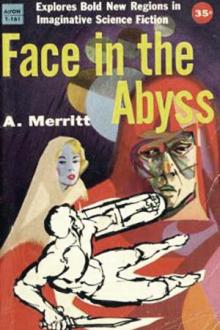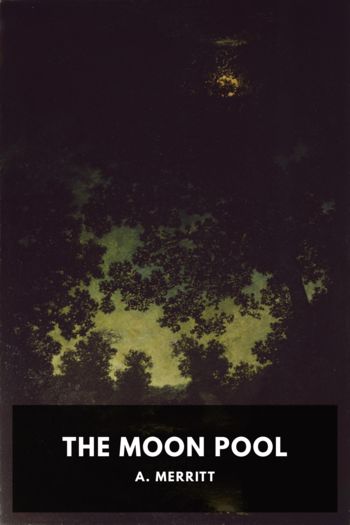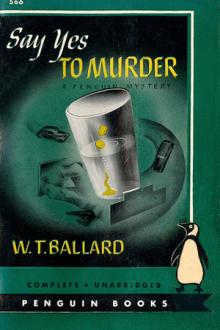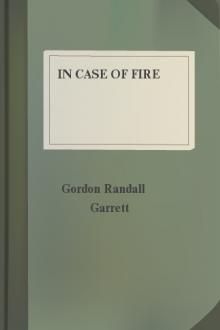The Face in the Abyss - Abraham Merritt (romance novel chinese novels .txt) 📗

- Author: Abraham Merritt
- Performer: -
Book online «The Face in the Abyss - Abraham Merritt (romance novel chinese novels .txt) 📗». Author Abraham Merritt
she would aid him.
He could not win to her by blundering into Yu-Adanchi like any reckless fool. But where could he hide until he had been able to reconnoiter, to make some plan….
“You,” he turned to the wounded man, decision made for good or bad, “have said your life is mine?”
The Indian again took his hand, and touched it to heart
and forehead.
“I would enter YuAtlanchi,” said Graydon, “but for a time I would not be seen by others there. Can you guide me, give me shelter, none but you knowing of my presence, until such time as I choose to go my own way?”
“Do you jest with us, Mighty Lord?” asked the first Indian. “What does one who wears the symbol of the Mother, and who wields this,” he pointed to the rifle, “need of our guidance? Are you not a messenger of … her? Did not those who are her servants let you pass? Lord, why jest with us?”
“I do not jest,” said Graydon, and, watching them narrowly, added, “Know you the Lord Lanflu?”
Their faces hardened, their eyes became suspicious; he knew that the two hated the master of the dinosaur pack. Good, he would tell them something more.
“I seek the Mother,” he said. “If I am not her messenger, I at least am her servant The Lord Lantlu stands between her and me. There are reasons why I must cope with him without her help. Therefore I must have time to plan, and he must know nothing of me until I have made
my plan.”
There was relief in their faces, and a curious elation. They whispered.
“Lord,” said the first, “will you swear by the Mother,”
again they made reverence to the bracelet, “raise her to your lips and swear by her that what you have said is truth; that you are no friend nor—spy—of the Lord Lantlu?”
Graydon raised the bracelet.
“I do swear it,” he said. “May the Mother destroy me utterly, body and spirit, if what I have told you is not truth.”
He kissed the tiny coiled figure.
Once more the Indians whispered.
“Come with us. Lord,” said the one who had vowed himself to Graydon. “We will take you to the Lord Huon. Until we come to him, ask us no more questions. You have asked us for shelter against the Lord Lantlu. We guide you to the only shelter against him. And you shall have it —if the Lord Huon wills it. If he does not will it—we will go with you or die with you. Can we do more?”
“By God!” said Graydon, touched to the heart, “neither you nor any man could do more for another. But I do not think that your Lord Huon, whoever he may be, will hold grudge against you for bringing me to him.”
Rapidly he went again over the wounded man; the tears and gashes were bad enough, but no arteries had been cut and no vital organs touched. .
“You have lost much blood,” Graydon told him. “I think we should carry you.”
But he would not have it so.
“It is but a little way now,” he said. “There is poison in the fangs and claws of the Urd, the lizardmen. The water of flame which you poured into my wounds burned most of it away, but not all I feel it, and it is better that I. walk if I can.”
“The Urd poison carries sleep,” explained the first Indian. “The sleep ends in death. The Mighty Lord’s water of flame conquered that sleep and made him awaken. Now he fears if he is carried he may sleep again, since, he says, the flame-water has ceased to burn.”
Graydon smiled at the description of the iodine that he had used on the wounds. Nevertheless, the reasoning was sound enough. If the venom of the lizardmen had a nar cotic action, then in the absence of any neutralizing agent the exercise of walking would help throw off the poison. He lifted the bandages from the deepest gashes and poured more iodine into them. By the tightening of the muscles,
he knew that the stuff bit.
“It is good,” said the Indian, “the water of flame burns.”
“It burns the poison,” said Graydon cheerfully. “If you have any other medicine, it will be well to use it.”
“There is such where we go,” said the first Indian. “But had it not been for yours. Lord, he would now be well advanced in the Urd sleep—and that is no peaceful one. Now let us go as quickly as we can.”
They resumed their way along the canyon. They had traveled probably a mile when, abruptly, the two walls of the cliffs swung toward each other. Separating them was a fissure some twenty feet wide, clean cut as though chiseled out of the rocks, and black as a starless night.
“Wait here,” said the first Indian, and walked to the fissure’s mouth. He drew from his pouch something that seemed to be a globe of rock crystal about as big as a tennis ball, its back cased in a cone of metal. He raised the globe above his head. A light sprayed from it into the tunnel. It was not a ray; it was like a swiftly moving, luminous ball of cloud. He dropped the globe back into his pouch, and beckoned.
They entered the fissure. It was no longer dark. It was filled with a pale luminosity, as though the cloud from the globe had dispersed a phosphorescent mist. They walked on a thousand feet or more. The Indian did not use the globe again, yet the light persisted.
He halted. Graydon saw that the fissure had ended. Outside was blackness. Far below was the sound of rushing water. The Indian raised the cone. Again the luminous cloud sprayed out
Graydon gasped. The luminous vapor was speeding over an abyss. Suddenly the face of a cliff sprang out, a hundred yards away. The cloud of light had impinged upon it. Instantly a part of the cliff lifted like an immense curtain. Out of the revealed portal shot a metal tongue, flat, ten
feet wide. It licked over the abyss, following the path of
light. It halted at their feet.
The Indians smiled at Graydon, reassuringly. “Follow me, Lord,” one said. “There is no danger.” Graydon stepped upon the span, the burro at his heels.
The roar of the torrent, hundreds of feet below, came up
to him.
They reached the end of that strange bridge. The Indians drew up beside him. They marched on for fifty paces. Looking back, he saw the entrance to the passage like a great gate of twilight. He heard a soft sighing, and the rectangle of twilight was blotted out. The curtain of rock had fallen.
Now light was all around him, soft and suffused ‘as though it were a quality of the air itself. He stood in a chamber that was a hollow cube perhaps a hundred feet square. Walls and roof were of polished black stone, and in the stone were tiny, swiftly moving luminous corpuscles like those he had watched stream out of the ebon walls of the cavern of the Face. They were the source of the light.
The place was empty, no sign of the passage through which they had come, nor of openers of the rock, nor machinery that controlled its opening; nor was there sign of door; nor was there trace of openings within the other walls. Yet Graydon heard a murmuring as of many people whispering within the chamber, and then a curt sentence, too rapidly spoken for him to understand.
The unwounded Indian saluted, and walked forward a few paces. He answered the challenger in the same rapid speech. But Graydon had no difficulty in getting his meaning. He was telling of the battle with the lizardmen. He finished; there was a brief silence, and then from the Unseen speaker came another quick command. The Indian beckoned.
“Lord, hold up the bracelet,” he said.
By now, of course, Graydon had realized that the unseen speaker was not really in the rock chamber, but behind the wall. His voice was carried by some tube device no doubt, and there were probably peepholes. Still, he
could see no sign of either, the shining black surface seemed unpierced, smooth as unbroken glass. He lifted the wrist on which was the golden image of the Snake Mother. The purple eyes gleamed. There was a louder burst of the murmurings, exclamations; another command.
“Lay down your weapon. Lord,” said the Indian, “and go forward to the wall.”
And then as Graydon hesitated:
“Do not fear. We will stand beside you—” The voice of the unseen speaker interrupted, sternly. The Indian shook his head, and took his stand beside Graydon, his comrade at the other hand. Graydon, knowing they had been ordered to remain behind while he went on alone, laid his rifle upon the floor, and whispered to them to obey. He walked forward, loosening the pistol in his armpit holster. And as he halted, the light blinked out.
Only for a moment did the darkness hold. When the radiance returned a third of the wall had vanished. Where it had been there stretched a corridor, wide and well lighted. On each side of it was a file of the Indians. Another file stood between him and the pair with the burro. They carried spears tipped with some shining black metal; they bore small round shields of the same substance. Their straight black hair was held by narrow fillets of gold. They were naked except for short kilts of quilted yellow silk. All this Graydon saw in one swift glance before his gaze came to rest upon the man beside him.
He was a giant of a man, his face that of a pure-blood of Suarra’s and Lantlu’s race; or had been, before catastrophic fight had marred it. He stood a good eight inches over Graydon’s six-foot height His hair was silver white, cut to the nape of his neck and held by a fillet of amber lacquer. From right temple to chin ran four parallel lines of livid scars. His nose had been broken and flattened. From his shoulders fell a coat-of-mail of the black metal, linked like those the Crusaders wore. It was gathered in at his waist by a belt Chain mail breeches covered his thighs and legs to the knees, baggily. The lower legs were protected by grieves from knees to the ankles of the sandaled feet. His right arm had been cut off at the elbow,
and attached to that elbow by a band of gold and held by a shoulder harness was a murderous three-foot metal bar. In his belt was a short double ax, twin to those which were the symbols of ancient Crete.
Formidable enough he was, but Graydon, looking into his eyes, drew from them reassurance. There were wrinkles of laughter at their corners, and humor and toleration that even his present suspicion and puzzlement could not entirely efface. Nor, despite his silver hair, was he old; forty at most, Graydon judged.
He spoke in the Aymara, and with a gusty, huskily roaring bass.
“And so you want to see Huon! Well, so you shall. And do not think us lacking in gratitude that I kept you waiting so long, and took from you your weapon. But the Dark One is subtle, and Lantlu, may his Xinli shred him, is like him. Nor would this be the first time that he has tried to foist spies upon us in the guise of those who would do us service. Regor is my name, Black Regor some call





Comments (0)